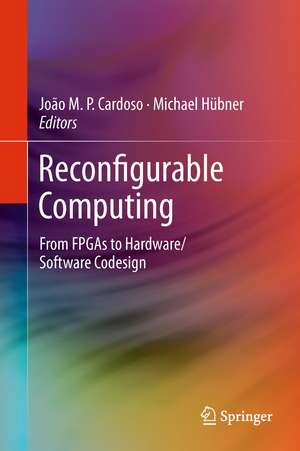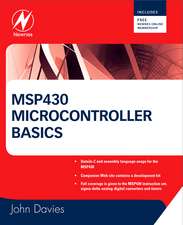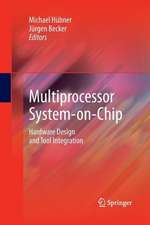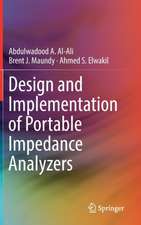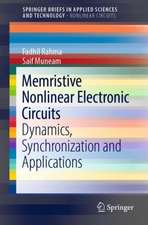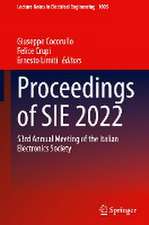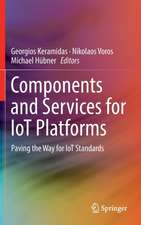Reconfigurable Computing: From FPGAs to Hardware/Software Codesign
Editat de Joao Cardoso, Michael Hübneren Limba Engleză Paperback – 26 noi 2014
| Toate formatele și edițiile | Preț | Express |
|---|---|---|
| Paperback (1) | 697.65 lei 43-57 zile | |
| Springer – 26 noi 2014 | 697.65 lei 43-57 zile | |
| Hardback (1) | 951.47 lei 43-57 zile | |
| Springer – 17 aug 2011 | 951.47 lei 43-57 zile |
Preț: 697.65 lei
Preț vechi: 820.76 lei
-15% Nou
Puncte Express: 1046
Preț estimativ în valută:
133.49€ • 139.75$ • 110.46£
133.49€ • 139.75$ • 110.46£
Carte tipărită la comandă
Livrare economică 07-21 aprilie
Preluare comenzi: 021 569.72.76
Specificații
ISBN-13: 9781489988591
ISBN-10: 1489988599
Pagini: 312
Ilustrații: XV, 296 p.
Dimensiuni: 155 x 235 x 16 mm
Greutate: 0.44 kg
Ediția:2011
Editura: Springer
Colecția Springer
Locul publicării:New York, NY, United States
ISBN-10: 1489988599
Pagini: 312
Ilustrații: XV, 296 p.
Dimensiuni: 155 x 235 x 16 mm
Greutate: 0.44 kg
Ediția:2011
Editura: Springer
Colecția Springer
Locul publicării:New York, NY, United States
Public țintă
ResearchCuprins
Introduction.- The Relevance of Reconfigurable Computing.- HiPEAC: Upcoming Challenges in Reconfigurable Computing.- MORPHEUS: Exploitation of Reconfiguration for Increased Run-time Flexibility and Self-adaptive Capabilities in Future SoCs.- hArtes: Holistic Approach to Reconfigurable Real-time Embedded Systems.- Smart Chips for Smart Surroundings.- AETHER: Self-adaptive Networked Entities: Autonomous Computing Elements for Future Pervasive Applications and Technologies.- ANDRES: Analysis and Design of Run-time Reconfigurable, Heterogeneous Systems.- CRISP: Cutting Edge Reconfigurable ICs for Stream Processing.- ERA: Embedded Reconfigurable Architectures.- REFLECT: Rendering FGGAs to Multi-core Embedded Computing.- Conclusion.
Textul de pe ultima copertă
As the complexity of modern embedded systems increases, it becomes less practical to design monolithic processing platforms. As a result, reconfigurable computing is being adopted widely for more flexible design. Reconfigurable Computers offer the spatial parallelism and fine-grained customizability of application-specific circuits with the postfabrication programmability of software. To make the most of this unique combination of performance and flexibility, designers need to be aware of both hardware and software issues. FPGA users must think not only about the gates needed to perform a computation but also about the software flow that supports the design process. The goal of this book is to help designers become comfortable with these issues, and thus be able to exploit the vast opportunities possible with reconfigurable logic.
Focuses on both hardware and software systems
Treats FPGAs as computing vehicles rather than glue-logic or ASIC substitutes
Assembles broad set of models for exploiting FPGA parallelism
Demonstrates how to use and manage reconfiguration
Provides broad set of case studies demonstrating how to use FPGAs in novel and efficient ways
Focuses on both hardware and software systems
Treats FPGAs as computing vehicles rather than glue-logic or ASIC substitutes
Assembles broad set of models for exploiting FPGA parallelism
Demonstrates how to use and manage reconfiguration
Provides broad set of case studies demonstrating how to use FPGAs in novel and efficient ways
Caracteristici
Focuses on both hardware and software systems Treatment of FPGAs as computing vehicles rather than glue-logic or ASIC substitutes Assembles broad set of models for exploiting FPGA parallelism Demonstrates how to use and manage reconfiguration Broad set of case studies demonstrating how to use FPGAs in novel and efficient ways Includes supplementary material: sn.pub/extras
